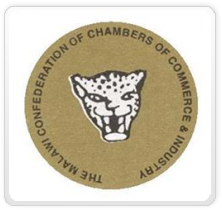Joyce Banda faulted on appointments as Chikankheni, Kaluwa retained as chair and deputy at MCCCI
Published on April 16, 2012 at 10:33 AM by FACE OF MALAWI
 A Malawi Confederation of Chambers of Commerce and Industry (MCCCI) annual general meeting held in Blantyre on Friday has retained Dulux Paints Managing Director Mathews Chikankheni and Combine Cargo owner Eddie Kaluwa as president and vice president of the chamber respectively.
A Malawi Confederation of Chambers of Commerce and Industry (MCCCI) annual general meeting held in Blantyre on Friday has retained Dulux Paints Managing Director Mathews Chikankheni and Combine Cargo owner Eddie Kaluwa as president and vice president of the chamber respectively.
Meanwhile, the congress – which took place at the Comesa Hall, has called on new state President Joyce Banda to appointment competent cabinet ministers who deliver and help her improve the country’s economy.
During the elections held as part of the AGM, both Chikankheni and Kaluwa went unopposed, getting another two year term of office.
However, the meeting ushered in a completely new list of councillors with the southern region bringing in Theodore Nyamandi from Dairibord, Wilkins Mijiga from National Bank and Newton Kambala of Mkaka Construction.
The northern region will be represented by Janet Thindwa from Kentam Products, Happy Nyasulu of Phwezi Foundation and Dinesh Chugh from Vizara Rubber Plantation.
The central region will for the meant time have no representation until the next AGM as there were only two members present to compete.
According to the chamber’s constitution, members competing for a position should be present on the day for consideration.
The members, drawn from all the three regions of the country, noted with concern that over the years their concerns were not addressed by government as the line ministry which is ministry of Industry and Trade had no powers to influence policy.
“We don’t want ministers who just go around companies begging. We want ministers who can deliver and help the sector grow and not those who want to benefit from various companies,” said one of the members.
The members also felt that treasury is squeezing them too much in terms of tax instead of addressing issues that would see the sector perform and contribute positively to the economy.
In his speech MCCCI, Chikankheni said the country still needs donors.
He said the country’s savings rate is still very low, hovering below 15 percent of Gross Domestic Product.
“We hardly attract foreign direct investment because of unattractive investment climate such as lack of power. Therefore external funding is necessary to fill our financial gaps. This is a reality of life,” said Chikankheni.
He described the year 2011 as the toughest as it was characterised by continued and worsening shortages of foreign exchange and fuel which have pass on effects on other industries.
Chikankheni also pointed out the ever increasing inflation rate which also dampened the outlook for Malawi businesses.
“The failure by Malawian companies to meet agreed terms of external transactions such as on time payments due to foreign exchange scarcity created a lot of challenges for businesses in the external environment,” he said.


